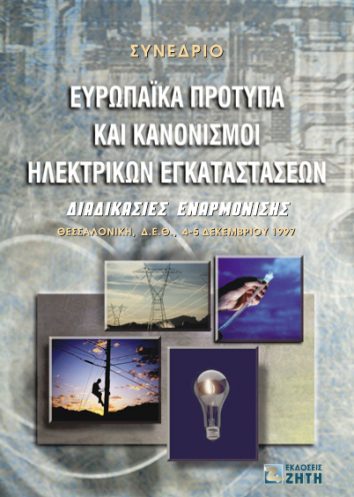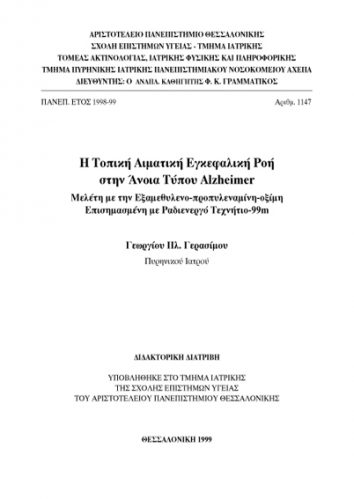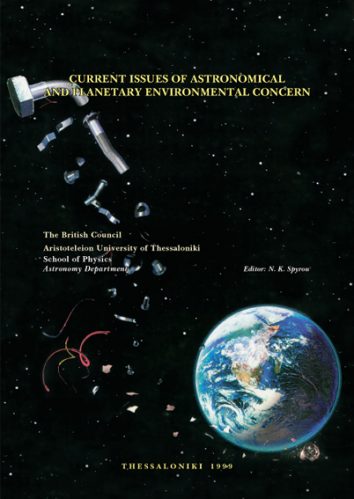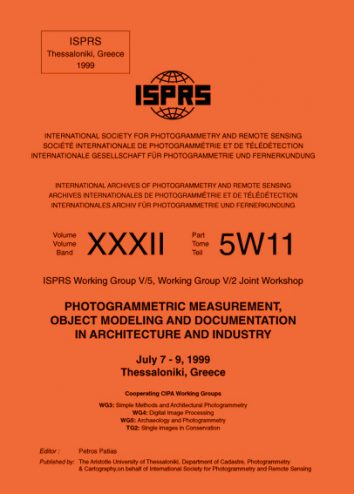
Hellenic Artificial Intelligence Society, Panayiotopoulos Themistoklis, Vouros George
3rd Hellenic Conference on Artificial Intelligence
SETN 04, Samos | Proceedings – Companion Volume
Artificial Intelligence has attracted a renewed interest from distinguished scientists and has again raised new, more realistic this time, expectations for future advances regarding the development of theories, models and techniques and the use of them both in practice and in applications, pervading many areas of our daily life. The borders of human-level intelligence are still very far away and possibly unknown. Nevertheless, recent scientific work inspires us to work even harder in our exploration of the unknown lands of intelligence.
This companion volume contains the papers selected for short presentation at the 3rd Hellenic Conference on Artificial Intelligence (SETN 2004), the official meeting of the Hellenic Society for Artificial Intelligence (EETN). The first meeting was held in the University of Piraeus, 1996 and the second in the Aristotle University of Thessaloniki (AUTH), 2002.
SETN conferences play an important role in the dissemination of the innovative and high-quality scientific results in Artificial Intelligence, which are being produced mainly by Greek scientists in institutes all over the world. However, the most important effect of SETN conferences is that they provide the context in which people meet and get to know each other, as well as a very good opportunity for students to get closer to the results of innovative Artificial Intelligence research.
SETN 2004 was organized by the Hellenic Society for Artificial Intelligence and the Artificial Intelligence Laboratory of the Department of Information and Communication Systems Engineering, the University of the Aegean. The conference took place on the island of Samos during 5–8 May 2004. We wish to express our thanks to the sponsors of the conference, the University of the Aegean and its School of Sciences for their generous support.
The aims of the conference were:
- To present the high-quality results in Artificial Intelligence research which are being produced mainly by Greek scientists in institutes all over the world.
- To bring together Greek researchers who work actively in the field of Artificial Intelligence and push forward collaborations.
- To put senior and postgraduate students in touch with the issues and problems currently addressed by Artificial Intelligence.
- To make industry aware of new developments in Artificial Intelligence so as to push forward the development of innovative products.
Artificial Intelligence is a dynamic field whose theories, methods and techniques constantly find their way into new innovative applications, bringing new perspectives and challenges for research. The growth in the information overload which makes necessary its effective management, the complexity of human activities in relation to the constant change of the environment in which these activities take place, the constantly changing technological environment, as well as the constant need for learning point to the development of systems that are more oriented to the way humans reason and act in social settings. Recent advances in Artificial Intelligence give us answers to these new lands of intelligence.
The 38 contributed papers in this companion volume, in conjunction to the 41 papers of the main proceedings volume were selected from 110 full papers by the program committee, with the invaluable help of additional reviewers; 13% of the submitted papers were submitted and co-authored by members of non-Greek institutions. We must emphasize the high quality of the majority of the submissions. Many thanks to all who submitted papers for review and for publication in the proceedings.
Members of the SETN 2004 program committee did an enormous amount of work and deserve the special gratitude of all participants. Our sincere thanks to the Conference Advisory Board for their help and support.
George Vouros, Themis Panayiotopoulos
Organization
SETN 2004 is organized by the department of Information and Communication
Systems Engineering, University of the Aegean and EETN (Hellenic Association
of Artificial Intelligence).
Conference Chair
George Vouros (University of the Aegean)
Conference Co-chair
Themis Panagiotopoulos (University of Piraeus)
Organizing Committee
George Anastasakis (University of Piraeus)
Manto Katsiani (University of the Aegean)
Vangelis Kourakos-Mavromichalis (University of the Aegean)
Ioannis Partsakoulakis (University of the Aegean)
Kyriakos Sgarbas (University of Patras)
Alexandros Valarakos (University of the Aegean)
Advisory Board
Nikolaos Avouris (University of Patras)
Ioannis Vlahavas (Aristotle University of Thessalonica)
George Paliouras (National Centre for Scientific Research “DEMOKRITOS”)
Costas Spyropoulos (National Centre for Scientific Research “DEMOKRITOS”)
Ioannis Hatzyligeroudis (Computer Technology Institute (CTI) and University
of Patras)
Table of Contents
Natural Language Processing
- Using Natural Language Generation to Support Interactive Concept Mapping
Harry Kornilakis, Kyparisia A. Papanikolaou, Evangelia Gouli - Representing knowledge in a Reflective Tutorial Dialogue System for Historical Text Comprehension
Maria Grigoriadou, Grammatiki Tsaganou, Theodora Cavoura - Combination of Machine Learning Approaches for Error Reduction in POS Tagging
Maria Koutsombogera, Alexis Konstandinidis, Harris PapageorgiouClassification, Machine Learning, Prediction - Efficient Mining of Uncertainty Rules using Adaptive Thresholds in Medical Data
Sokratis Konias, Panagiotis D. Bamidis, Nicos Maglaveras - Building Decision Trees with Components
Spyros Christodoulou, Katerina Hantzara, Dimitris Kalles, Athanasios Papagelis - Evolutionary Conditional Rules for Signal Prediction
Adam Adamopoulos, Efstratios Georgopoulos, Spiridon Likothanassis - Inter-Transaction Association Rules Mining for Rare Events Prediction
Christos Berberidis, Lefteris Angelis, Ioannis Vlahavas - Classification of Abnormal Tissue in Digital Mammography Using Support Vector Machines
Ioanna Christoyianni, George Georgoulas - Machine Learning Techniques for Prediction of Rare Events in a Business Environment
Sophia Daskalaki, Ioannis Kopanas, Nikolaos Avouris - Using Hierarchical Clustering to Enhance Classification Accuracy
Matthaios Theodorakis, Andreas Vlachos, Theodore Z. Kalamboukis - Classification of Cardiotocograms based on Independent Component Analysis and Support Vector Machines
George Georgoulas, Chrysostomos Stylios, Peter P. Groumpos - Automated Expert Knowledge Base Generation Using Genetic Programming
Athanasios Tsakonas, Georgios DouniasApplications - A Multi-Agent Technology Approach to Medium Voltage Power Distribution Systems Protection
Ioannis S. E. Baxevanos, Dimitris P. Labridis - Acoustic-Emission Source Location in typical structures using Genetic Algorithms
Efstratios Lympertos, Vassilios Kappatos, Evangelos Dermatas - A Multi-Agent System to Automate Human Gene Prediction by Integrating Heterogeneous Computational Tools
Vassilis Koutkias, Andigoni Malousi, Ioanna Chouvarda, Nicos Maglaveras - Novel Fitness Functions in Genetic Algorithms for Human Immune System Simulation
Christos Giannoulis, Grigorios Beligiannis, Lambros Skarlas, Spiridon Likothanassis, Ioannis Hatzilygeroudis - A Fuzzy Logic Approach to Congestion Avoidance Techniques in TCP
Christos Douligeris, Panagiotis Kostopoulos, George Develekos - Dynamic Access Control Management Using Expert System Technology
G. Pangalos, G. Vakaros, Ch. Georgiadis, I. Nestori, K. KemalisInformation Management - Agglomerative Hierarchical Clustering For Musical Database Visualization and Browsing
Aristomenis S. Lampropoulos, George A. Tsihrintzis - Modeling Information Extraction Wrappers with Conceptual Graphs
F. Kokkoras, N. Bassiliades, I. Vlahavas - Using Branching-Time Logic to Optimize an Extended Class of Datalog Queries
Petros Potikas, Manolis Gergatsoulis, Panos Rondogiannis - CrawlWave: A Distributed Crawler
Apostolos Kritikopoulos, Martha Sideri, Kostantinos Stroggilos - Comparing Point and Block Representation in Computer Vision and Image Processing Tasks
B. Gatos, N. Papamarkos, S. J. Perantonis - On the Combination of Collaborative and Item-based Filtering
Manolis Vozalis, Konstantinos G. Margaritis - A Cognitive Approach to Personalised Web Directories
George D. Magoulas, Sherry Y. Chen, Dionisios DimakopoulosEnvironments for Learning and Storytelling - CULTOS: Cultural Units of Learning Tools and Services
Aristomenis Macris - Improving the Effectiveness of Interactive Open Learning Environments
Manolis Mavrikis - “Young writers in . . . action”: a Web-based Collaborative Learning Environment for Creating Stories
Vassilis Economou, Yannis Kotsanis, Katerina Passissi, Evie Trouki, Thomas Vlachos - Pythagoras : A 3D Interactive Geometry learning environment
Giorgos Vafiadis, Christos Aggelopoulos, Vrettos Moulos, Ioannis Pratikakis - PROTEIN: A Procedural Texture Authoring tool
I. Makris, I. Pratikakis - Emergent Narrative, requirements and high-level architecture
Sandy Louchart, Ruth Aylett - Aiming for a Rashomon Storyteller
Alejandro Ramirez, Josep BlatKnowledge Representation - Simple Distributed Filtering on a CLP Platform
Ilias Sakellariou, Ioannis Vlahavas - Towards a General Purpose Intelligent-Agent-Oriented Programming Language
George Anastassakis, Themis PanayiotopoulosCognitive Modelling - Accelerating the Hamming MAXNET
Konstantinos Koutroumbas - Piecewise continuous approximation of two–dimensional functions using neural networks
I. G. Tsoulos, I. E. Lagaris, A. Likas - Time-Decaying Representations of Streaming Time Series
Themistoklis Palpanas, Michail Vlachos, Eamonn Keogh, Dimitrios Gunopulos, Wagner Truppel - Adding Reasoning and Cognition to the Internet
M. Sifalakis, M. Mavrikis, G. Maistros




